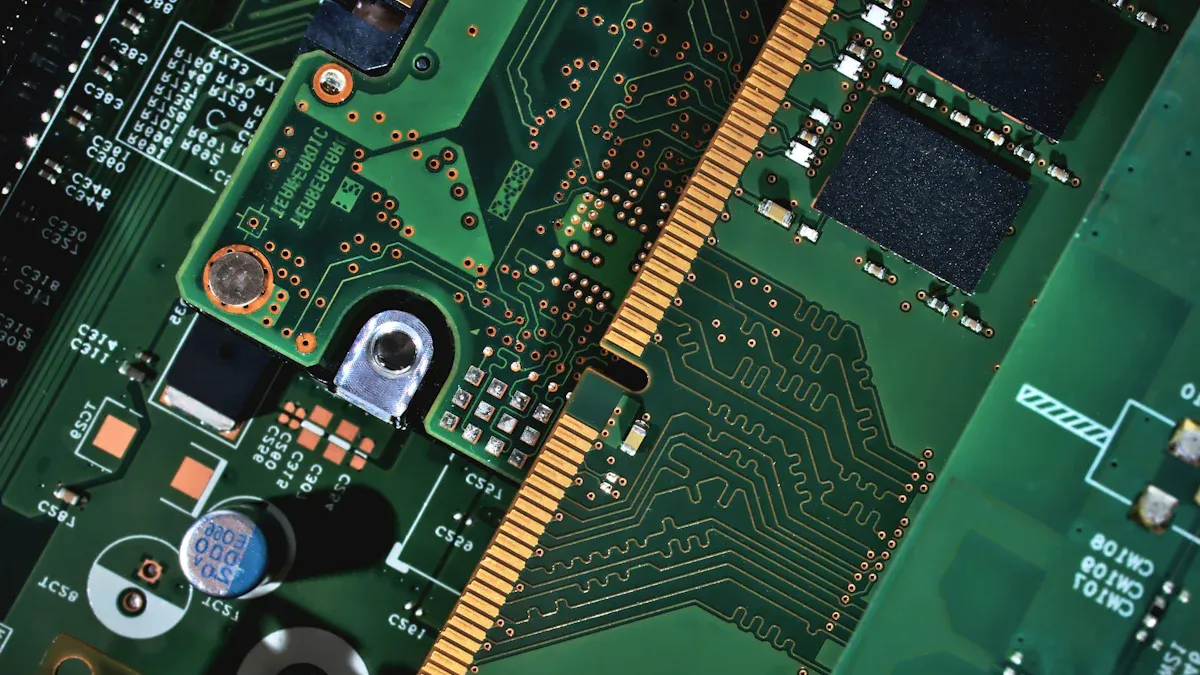
ITAR compliance plays a crucial role in ITAR compliant PCBA manufacturing, particularly for industries connected to national defense. It ensures that manufacturers adhere to stringent regulations for managing defense-related technologies. By maintaining ITAR compliance, manufacturers safeguard sensitive information and align with government requirements.
Current market trends highlight the importance of ITAR compliance. ITAR-certified manufacturers experience faster revenue growth, averaging about 12% annually. They also secure 30% more government contracts, demonstrating a competitive edge. Additionally, compliance fosters client trust, boosting retention rates by 25%. These advantages make ITAR compliant PCBA manufacturing not only a legal necessity but also a strategic and beneficial decision.
Key Takeaways
ITAR rules are important for PCBA makers in defense and aerospace. They keep sensitive data safe and follow government rules.
Companies that follow ITAR can grow faster and get more government jobs. This makes them stronger against competitors.
Training and checks help workers learn ITAR rules. This stops big mistakes and keeps the company following the rules.
Keeping data safe is very important. Use secure systems to protect data and let only trusted people see it.
Learning new ITAR rules and doing regular checks can stop legal problems. It also helps gain trust from clients and the government.
Understanding ITAR Compliance
Definition and Scope of ITAR
ITAR, short for International Traffic in Arms Regulations, controls the trade of defense-related items, services, and data. It was created in 1976 under the Arms Export Control Act (AECA) to protect national security during the Cold War. ITAR covers items listed on the United States Munitions List (USML), including military gear, electronics, and secret technical data.
The rules have changed over time. For example:
In 1999, the U.S. Department of State took charge of satellite export rules, making enforcement stricter.
In 2013, satellite technology was removed from ITAR, showing shifts in defense priorities.
Even with updates, ITAR compliance is still tricky. It involves many federal agencies, making it hard for manufacturers to follow all the rules.
Tip: Knowing what ITAR covers helps you check if your products or services need compliance.
Key Regulations Under ITAR
ITAR rules aim to control the trade of defense-related goods and services. These rules apply to categories listed in the USML, such as:
Description | |
|---|---|
V | Explosives and Energetic Materials |
VI | Surface Vessels of War |
VIII | Aircraft and Related Articles |
XI | Military Electronics |
XV | Spacecraft and Related Articles |
Each category lists specific items that are regulated. For example, Category XI includes military electronics, while Category XV covers spacecraft and related technologies.
The Department of State updates ITAR rules to keep up with new technologies. Recent changes explained terms like “spacecraft” and excluded some items. These updates try to balance security with innovation.
Note: Mislabeling items under ITAR can lead to big fines. Always check your product against the USML.
Industries Impacted by ITAR
ITAR compliance affects industries working with defense-related technologies. Important sectors include:
Defense companies making weapons and military gear.
Aerospace firms building aircraft and spacecraft.
Cybersecurity businesses handling sensitive defense information.
Government suppliers and Department of Defense (DoD) contractors.
Research groups developing military technology.
These industries must follow strict rules to protect technical data and stop illegal exports. For example, aerospace firms need to ensure spacecraft parts meet ITAR rules to avoid legal trouble.
Tip: If your business is in these fields, focus on ITAR compliance to win government contracts and gain client trust.
ITAR-Compliant PCBA Manufacturing

How ITAR Applies to PCBA Processes
ITAR rules affect how printed circuit board assemblies (PCBA) are made. Manufacturers must follow these rules at every step, from design to production. This includes keeping technical data secure, limiting foreign worker access, and tracking all parts carefully.
For instance, if your PCBA work involves military or aerospace items, you must classify them under the United States Munitions List (USML). You also need to check that your suppliers follow ITAR rules. Breaking these rules can cause big problems, like losing contracts or paying heavy fines.
Did you know? Breaking ITAR rules can cost up to $500,000 per mistake. Serious cases may lead to $1,000,000 fines and 10 years in jail.
Following ITAR in your PCBA work not only meets legal needs but also shows you are a trustworthy manufacturer.
ITAR-Controlled PCBA Component Examples
Many PCBA parts are under ITAR rules because they are used in defense and aerospace. Examples include:
Military-grade microprocessors: Work in tough conditions, used in weapons.
Encrypted communication modules: Keep military data safe during transfers.
Guidance system components: Help missiles and defense tools stay accurate.
Radar and sensor systems: Important for watching and gathering information.
These parts need careful handling to stop unauthorized use. Manufacturers must track and document everything to stay compliant.
Tip: Always check if a part is on the USML before using it in your PCBA. This can prevent costly errors.
Why Protecting Technical Data Matters
Keeping technical data safe is key in ITAR-compliant PCBA work. ITAR requires companies to secure sensitive information to protect national security.
Aspect | What It Means |
|---|---|
Legal Obligation | Companies in defense and space must follow ITAR rules. |
National Security | Protecting data helps keep the country safe. |
Safeguarding Information | ITAR demands secure handling of technical data to block unauthorized access. |
To protect data, limit access to approved workers, use secure systems, and check your processes often. For example, ITAR says only U.S. citizens or approved foreign nationals can access military tech. Your supply chain must also follow these rules.
Why it matters: Protecting data helps national security and supports defense and aerospace industries.
Strong security not only ensures compliance but also builds trust with clients and government groups. This trust can lead to long-term deals and more chances in ITAR-regulated fields.
Importance of ITAR Compliance
Legal Consequences of Non-Compliance
Breaking ITAR rules can cause serious legal trouble. Fines can go up to $1 million for each violation. Civil penalties may reach $500,000. Some people even face jail time. For instance, a professor got four years in prison for sharing Air Force research without approval. In 2018, 186 people and companies were punished for breaking ITAR rules. They lost export licenses and government contract chances.
Not following ITAR rules risks money, legal issues, and your business. Staying compliant helps you avoid these problems. It also keeps your reputation as a trusted manufacturer in the defense industry.
Operational Risks in Manufacturing and Supply Chains
Breaking ITAR rules can mess up your manufacturing and supply chain. If you don’t secure data or classify items right, you could lose export rights. This can stop production and delay deliveries, upsetting your clients.
ITAR compliance needs strong data security and good records. Without these, your company risks data leaks and unauthorized access. Regular checks help find problems and fix them. By following ITAR, you protect your work and keep things running smoothly.
Reputational Benefits of Compliance
Following ITAR rules makes your company look good in defense work. Clients and the government trust companies that follow the rules. A strong compliance plan shows you care about safety and national security.
When you follow ITAR, clients trust you more. This trust can lead to long-term deals and more government contracts. A good reputation also helps you stand out from competitors who don’t follow the rules.
Tip: Following ITAR is more than avoiding fines. It helps your business grow and opens new doors.
Steps to Achieve ITAR Compliance

Registering with the DDTC
To follow ITAR, you must register with the Directorate of Defense Trade Controls (DDTC). This is required for companies making, exporting, or handling defense items listed on the United States Munitions List (USML). Registering shows the U.S. government that you follow ITAR rules.
Fill out the DS-2032 form and pay the fee to register. This step confirms your company is allowed to work in defense industries. After registering, you get a code needed for export licenses and other ITAR approvals.
Tip: Renew your registration every year. Missing renewal can lead to fines or losing export rights.
Implementing Secure Data Management Practices
Keeping sensitive data safe is key to ITAR compliance. You need strong systems to stop leaks or unauthorized access. First, find all ITAR-controlled data in your company. Use secure tools to store and share this data, allowing access only to approved workers.
Encryption helps protect data. Encrypt stored and shared data to keep it safe. Also, check access logs often to catch any unauthorized attempts.
Steps to follow:
Check your product’s Export Control Classification Number (ECCN).
See if the destination country needs an export license based on the ECCN.
Why it matters: Good data security protects national safety and avoids big fines.
Employee Training on ITAR Regulations
Employees are important for following ITAR rules. Training helps them understand how to handle controlled items and data safely.
Create a training program that explains ITAR rules. Teach employees how to spot ITAR-controlled items, protect data, and report problems. Use real-life examples to make lessons clear and interesting.
Offer regular updates to keep employees informed about rule changes. Encourage them to ask questions or share concerns.
Tip: Keep records of all training sessions. This shows your commitment to compliance during inspections.
Conducting regular compliance audits.
Regular audits are key to following ITAR rules. They help find problems in your processes and ensure you meet ITAR standards. These checks protect sensitive data, prevent fines, and improve security.
To run good audits, follow these steps:
Check if your controls work well. This ensures your systems follow ITAR rules.
Compare your compliance level to ITAR standards. This shows where you need to improve.
Write down issues and fix them. This helps you get better over time.
Audits also lower risks of breaking ITAR rules. For example, they can find weak spots in how you handle data or manage your supply chain. Fixing these problems quickly stops data leaks or unauthorized access. Audits also check if employees follow ITAR rules, making sure they know their duties.
Plan audits every year or when big changes happen. Use both internal and external auditors for a full review. Internal audits check daily work, while external ones give expert advice and an unbiased view.
Tip: Keep records of all audits. These show your dedication to ITAR and help during inspections.
By doing regular audits, you follow ITAR rules and build strong operations. This helps you gain trust as a dependable partner in defense industries.
Avoiding ITAR Compliance Challenges
Common Mistakes in ITAR Compliance
Following ITAR rules can be tough, and companies often slip up. Some frequent mistakes are:
Forgetting to report political donations or commissions as needed.
Not checking export rules for countries like China, which caused half of all ITAR violations since 2012.
Doing export activities with Iran, a major focus of U.S. export controls.
These errors can lead to big punishments. For instance, one U.S. company had to pay $27 million for breaking ITAR rules. To avoid such issues, always do proper research, keep detailed records, and make sure your actions follow ITAR guidelines.
Tip: Regular checks and reviewing business partners can catch and fix problems early.
Correctly Classifying Controlled Items
Classifying controlled items correctly is key to following ITAR. Mistakes in classification can cause serious problems, like:
Problem | What Happens |
|---|---|
Big Fines | Criminal fines can reach $1 million, and civil ones $120,000. |
Shipment Delays | Wrong classifications may hold shipments for customs checks. |
Goods Taken | Customs might seize items, adding extra costs. |
Losing Export Rights | Repeated mistakes could mean losing export licenses. |
Extra Audits | Errors might trigger audits, slowing down work. |
Jail Time | Serious violations could lead to prison sentences. |
To avoid these issues, ask experts for help and use ITAR checklists. These tools help you find controlled items and set up strong compliance systems.
Note: Knowing ITAR rules and how to classify items can save you from costly mistakes.
Improving Data Security Systems
Improving data security is crucial to protect ITAR-controlled information. Advanced tools like Secure File Transfer Protocol (SFTP) and Transport Layer Security (TLS) encrypt data and keep it safe. Using these tools offers:
Better protection from hackers with strong encryption.
Safer systems with multi-step login processes.
Companies with good data security have 48% fewer breaches than those with weak systems. Strong data management also lowers compliance risks and saves money.
Why it matters: Good data security keeps you compliant, builds trust, and helps your business succeed.
Practical strategies for compliance success.
Following ITAR rules needs careful planning and smart actions. Using simple steps can make work easier, lower risks, and follow the rules. Here are ways to succeed:
Secure Technical Data Management: Keep technical data safe with clear rules. Use secure tools to stop unauthorized access. Tools like Altium 365 GovCloud help protect sensitive design data.
Optimize PCB Design Practices: Use approved parts and secure systems during PCB design. This helps follow ITAR rules from the start of production.
Control Facility Access: Limit who can enter work areas and use equipment. Only trained workers should handle ITAR materials. Store and track items safely to protect them.
Document Processes and Quality Control: Write down all steps and checks in manufacturing. These records prove you follow ITAR rules during inspections.
Export Compliance: Label and classify shipments correctly. Get export licenses before shipping ITAR items. Work with experts who know ITAR rules to avoid problems.
Adapt to Regulatory Changes: Stay updated on ITAR rule changes. Adjust your practices to avoid mistakes and keep following the rules.
To check how well your strategies work, track important numbers like:
Compliance Metric | Description |
|---|---|
Counts how many applications are checked to see if the process works well. | |
Time taken to complete the review | Measures how fast the review process is, showing efficiency. |
Number of applications approved or denied | Tracks results of applications to find problems or successes. |
Regular checks are also important for following ITAR rules. These checks make sure your company follows both internal and external rules. By using these strategies and watching your progress, you can build strong ITAR-compliant operations.
Tip: Check your partners’ history with ITAR and review transactions against denied party lists to improve compliance.
ITAR compliance is very important in PCBA manufacturing. It matters most for defense and aerospace industries. It helps you follow laws, keep data safe, and work smoothly. By following ITAR, you avoid big fines and gain trust as a reliable partner in defense projects.
Reminder: Following rules isn’t just about avoiding trouble. It helps you win government deals and grow your business.
Using ITAR-compliant methods makes your company stronger. Start now by securing systems, teaching workers, and checking your processes often. Staying compliant will help you stand out in tough markets.
FAQ
What is ITAR, and why does it matter for PCBA manufacturing?
ITAR stands for International Traffic in Arms Regulations. It controls the export of defense-related items and data. In PCBA manufacturing, ITAR helps protect sensitive information and supports national security.
How can your company follow ITAR rules?
Use an ITAR compliance checklist. Register with the DDTC, secure data, train workers, and check processes often. These actions help you follow ITAR and avoid problems.
What happens if you don’t follow ITAR rules?
Breaking ITAR rules can cause big fines, lost export rights, and hurt your reputation. Companies that follow ITAR avoid these risks and gain trust in defense industries.
How does ITAR impact suppliers?
ITAR requires strict rules for suppliers. You must make sure all suppliers follow ITAR to stop unauthorized access to defense items or data.
What tools help with ITAR compliance?
Use secure systems to manage data and classify items. These tools make following ITAR easier and help meet export rules.
See Also
Steps to Ensure ITAR Compliance in PCB Assembly
Understanding PCBA Manufacturing and Its Significance
Why PCBA Manufacturing Skills Are Crucial for Electronics